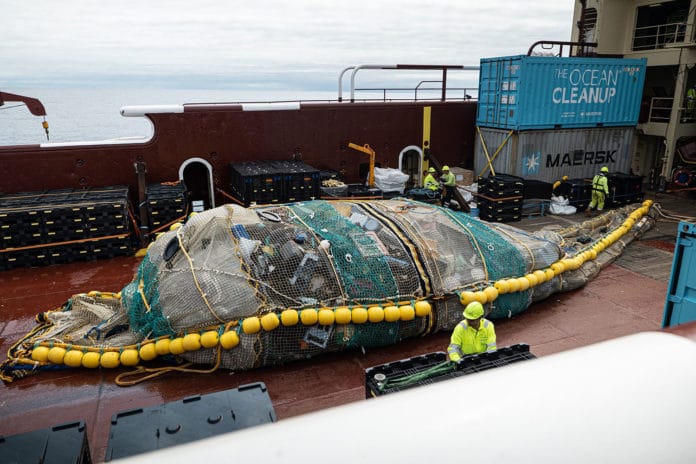In August 2021, the Ocean Cleanup Project launched System002 or “Jenny” in the Great Pacific Garbage Patch, an oceanic accumulation of trash so large, it is often referred to as a garbage island. The garbage patch is considered the world’s largest accumulation of ocean plastic, encompassing more than 1.8 trillion pieces, according to the Ocean Cleanup’s estimates.
The redesigned trash-collecting system recently completed its final phase of testing and has collected a fresh batch of garbage, the Ocean Cleanup revealed.
After years of research and millions of dollars invested, the Ocean Cleanup launched its first attempt at a plastic-catching device in 2018, but the prototype broke in the water. The later version, released in 2019, did a better job of collecting plastic, but the organization estimated that it would need hundreds of those devices to clean the world’s oceans.
So the team upgraded the system and returned to the Pacific Ocean in early August. The system is essentially an artificial floating coastline that catches plastic in its fold like a giant arm, then funnels the garbage into a woven funnel-shaped net. Rather than relying on a floating system that moved with the wind and the motion in the ocean, the horseshoe-shaped Jenny would be towed along by crewed vessels at either end.
The idea is to move the Jenny through a large Pacific garbage patch at a constant speed of 1.5 knots, directing the plastic waste to a dedicated storage area. The trash-collecting system is up to 800 meters long, making it the largest system deployed under the Ocean Cleanup projects.
The team has already tested the system in more than 70 separate tests. The final testing of the system was completed over the weekend and, according to experts, was a great success.
“It all worked!!! Massive load. We’ll try to get the footage to land ASAP to share,” tweeted Ocean Cleanup CEO Boyan Slat.
The Ocean Cleanup said the device hauled 9,000 kilograms (20,000 lbs) of trash out of the Pacific Ocean in 12 days – proof that the garbage patch could eventually be cleaned up.
“It’s crazy to see how much the density of the patch differs per location. During the full duration test, we collected 9000kg in 12 days. We just extracted another 4500kg, of which ~2000kg was collected in a single day. Really underlines the importance of hot spot modeling,” Slat tweeted today.
It is estimated that the team would need about 10 Jennys to clean up 50% of the Great Pacific Garbage Patch in five years. A single device can hold 10,000 to 15,000 kilograms of plastic.
Millions of tons of plastic waste are sent into the ocean every year, so many questions the ability of such barriers to effectively deal with waste. However, at the moment, this is the only available way to deal with this problem.
The company aims to remove 90% of the plastic from the oceans by 2040. Once it’s brought to shore, the plastic gets recycled to make sustainable products like pairs of sunglasses.
